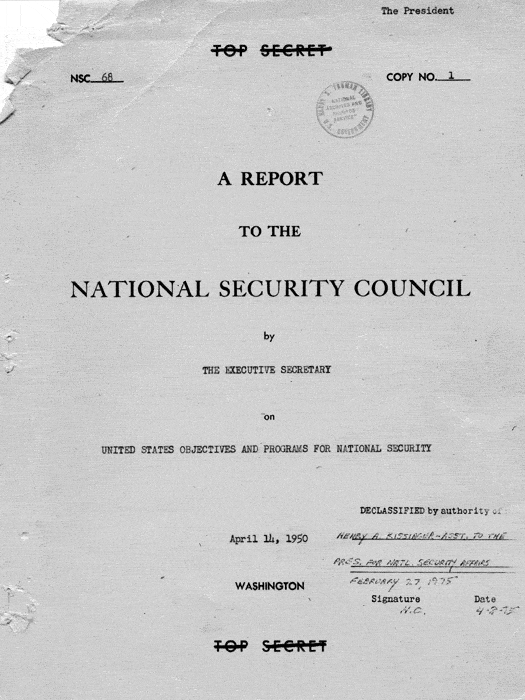Conclusion
The foregoing analysis indicates that the probable fission bomb capability and possible thermonuclear bomb capability of the Soviet Union have greatly intensified the Soviet threat to the security of the United States. This threat is of the same character as that described in NSC 20/4 (approved by the President on November 24, 1948) but is more immediate than had previously been estimated. In particular, the United States now faces the contingency that within the next four or five years the Soviet Union will possess the military capability of delivering a surprise atomic attack of such weight that the United States must have substantially increased general air, ground, and sea strength, atomic capabilities, and air and civilian defenses to deter war and to provide reasonable assurance, in the event of war, that it could survive the initial blow and go on to the eventual attainment of its objectives. In return, this contingency requires the intensification of our efforts in the fields of intelligence and research and development.
Allowing for the immediacy of the danger, the following statement of Soviet threats, contained in NSC 20/4, remains valid:
The gravest threat to the security of the United States within the foreseeable future stems from the hostile designs and formidable power of the USSR, and from the nature of the Soviet system.
The political, economic, and psychological warfare which the USSR is now waging has dangerous potentialities for weakening the relative world position of the United States and disrupting its traditional institutions by means short of war, unless sufficient resistance is encountered in the policies of this and other non-communist countries.
The risk of war with the USSR is sufficient to warrant, in common prudence, timely and adequate preparation by the United States.
Soviet domination of the potential power of Eurasia, whether achieved by armed aggression or by political and subversive means, would be strategically and politically unacceptable to the United States.
******
In the light of present and prospective Soviet atomic capabilities, the action which can be taken under present programs and plans, however, becomes dangerously inadequate, in both timing and scope, to accomplish the rapid progress toward the attainment of the United States political, economic, and military objectives which is now imperative.
A continuation of present trends would result in a serious decline in the strength of the free world relative to the Soviet Union and its satellites. This unfavorable trend arises from the inadequacy of current programs and plans rather than from any error in our objectives and aims. These trends lead in the direction of isolation, not by deliberate decision but by lack of the necessary basis for a vigorous initiative in the conflict with the Soviet Union.
Our position as the center of power in the free world places a heavy responsibility upon the United States for leadership. We must organize and enlist the energies and resources of the free world in a positive program for peace which will frustrate the Kremlin design for world domination by creating a situation in the free world to which the Kremlin will be compelled to adjust. Without such a cooperative effort, led by the United States, we will have to make gradual withdrawals under pressure until we discover one day that we have sacrificed positions of vital interest.
It is imperative that this trend be reversed by a much more rapid and concerted build-up of the actual strength of both the United States and the other nations of the free world. The analysis shows that this will be costly and will involve significant domestic financial and economic adjustments.
******
In summary, we must, by means of a rapid and sustained build-up of the political, economic, and military strength of the free world, and by means of an affirmative program intended to wrest the initiative from the Soviet Union, confront it with convincing evidence of the determination and ability of the free world to frustrate the Kremlin design of a world dominated by its will. Such evidence is the only means short of war which eventually may force the Kremlin to abandon its present course of action and to negotiate acceptable agreements on issues of major importance.





